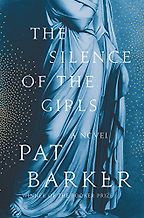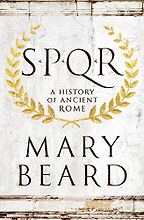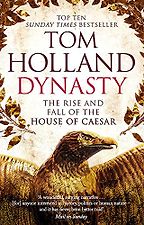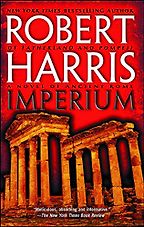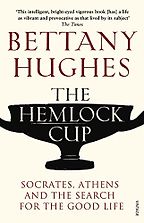You’ve been teaching classics to teenagers for a number of years now. What do you think attracts students to the subject? These are languages that are long dead and events that happened millennia ago.
It’s a standard answer to say that at the foundation of European or Western civilisation, you find Roman and Greek cultures. I personally got into it based on the language. The students at this school really like the challenge provided by Latin and Greek and feel unique in being given the opportunity to start learning these languages from an early stage.
When they get to GCSE and A Level, we can say, ‘You know all those sentences you were doing about slaves chasing horses and all that basic stuff? Well, now you can unlock the world of Herodotus, of Homer, of Caesar.’ You get to study the texts of these amazing, controversial, contradictory figures in the original. They really like that.
They also love the scope offered by classics. At times, it’s a language exercise; at other times, it’s history. We also get to study poetry in a lot of detail, as well as philosophy. It’s the only subject still remaining that covers all aspects of their education.
Is it very popular?
As with any subject, its popularity goes through peaks and troughs. It’s quite cyclical. Without wanting to jinx it, we’re doing quite well at the moment: our GCSE numbers are going up (just over half the year take it at GCSE), and then, at A Level, the subject is taken by about 15 out of a year group of around 95.
Once you get to A Level, you’re getting squeezed by all number of other subjects. Many students are talented at so many different things—they want to do science; they want to do maths; they want to do history. The fact we have a good, steady classics cohort is really nice. I think a few years down the line, the numbers might dip, but right now it is very popular. It’s something a bit different, which they appreciate.
So when you were choosing these books—which you first recommended on the WAS Classics Twitter feed—did you choose them as essential reading or more as fun books to get students into classics?
It’s probably a bit of both. One of the other department members runs a classics book club. He picks a book and gets it for the girls who want it and they read it over the course of the term. Then we have a pizza in the library and discuss it. That’s how I picked the first book, The Silence of the Girls.
The Robert Harris book—Imperium—I picked partly because it’s one of my favourites. The others I chose because they’re quite useful primers to get into the subject without being ‘histories for dummies.’ The books by Mary Beard, Tom Holland and Bettany Hughes each argue a point. They’re good, solid reads, but they’re also very accessible, particularly for students who are studying at A Level. But even for those who aren’t—you can read them from Year 7 [6th Grade] and up, really, there’s nothing too ‘out there’ in them.
It seems like histories these days are much less dry than when I was at school. Both the look of these books and the way they’re written are almost racy.
The Tom Holland one in particular doesn’t spare the gory details. You’ve got to get the balance right, because you don’t want people reading it purely for, say, the insane things that Nero or Caligula do. You want to read it for the history, but keep it entertaining, too.
History is my favourite aspect of classics. It’s mad what happens in Roman and Greek history—there’s so much weird stuff going on. Ancient Athens was this tiny community of about 10,000 people; with all these amazing people in the same place at the same time, it created fireworks.
Let’s go through the books individually now. You’ve already mentioned The Silence of the Girls by Pat Barker. Tell me what it’s about and why you like it.
This is a retelling of the Iliad through the eyes of Briseis, the slave girl who is captured by the Greeks. It’s a very intense read, probably one we would recommend for the more senior students at school, because there are quite savage depictions of rape and the reality of what it was like for women to be in the Greek camp. It doesn’t spare any of the detail.
As a teacher, you can have read the Iliad countless times, but it’s one of those things where suddenly you realise that you haven’t really thought about what it was like for women in the camp. This book allows you to realise that one of the key issues with the classics—one of the things that we’re always fighting against—is the lack of information we have about women. Particularly when you’re teaching at an all-girls school, it’s something you come back to again and again: what was it like for women? We can just about work out what it was like for aristocratic women, but what it was like for poorer women, women of lower social status and prostitutes? This book is an uncomfortable read but a very worthy one.
The Silence of the Girls is a novel rather than a history. Does a novel allow you to enter into what life was like for a woman in a way nonfiction can’t?
The book is based on the Iliad, which is already mythical, legendary—whatever you want to call it—but it being a work of fiction does allow for certain creative liberties. It means Pat Barker can not only bring in ideas of what women’s lives were like in 4th and 5th century Athens, but also transplant it into this accessible sphere. So perhaps historical fiction does allow for more scope in that area.
I’ve started reading it and am finding it quite hard to put down. Can you maybe remind us why Briseis is so crucial to the story of the Iliad?
So Chryseis is owned by Agamemnon, and Briseis by Achilles. Chryseis’s dad is a priest of Apollo and he brings down a plague on the Greeks. So, Agamemnon has to hand back Chryseis and he doesn’t want to. In the midst of all this, Achilles says, ‘Well, you need to do what you’re told’ and Agamemnon replies, ‘If I’m going to do that, I’m going to take Briseis off you.’ Briseis is taken away from him and so Achilles refuses to fight. Because he’s the best fighter of all the Greeks, it leads to devastation for them throughout the Iliad. Eventually, he brings himself back into the fighting because Patroclus, his best friend, is killed in an attack on Troy.
The first line of the Iliad is “Sing, O muse, of the rage of Achilles” and it’s basically about Achilles’s anger cycle. He gets angry; he stays angry; he becomes less angry—though he’s still pretty angry all the way through.
Briseis is important because (and again, it’s an unsettling truth about the Iliad) she is property, passed from person to person. What The Silence of the Girls does is say, ‘Let’s look past what Homer gives us, and look at what it would have been like for her.’
Sign up here for our newsletter featuring the best children’s
and young adult books, as recommended by authors, teachers, librarians and,
of course, kids.
There’s a line in the Iliad where Priam kisses Achilles’s hands. Achilles has just murdered his son, Hector, and Priam says, ‘I do what no man before me has ever done; I kiss the hands of the man who killed my son.’ In the book, Briseis says, ‘And I do what countless women before me have been forced to do. I spread my legs for the man who killed my husband and my brothers.’ So it’s an interesting change around of the pattern. It works really well.
I like the way Briseis is friendly with Helen, so you meet her as well.
Yes, Helen is this mystical figure: you’re never quite sure what’s going on with her. And that’s a very faithful retelling of what she’s like in the Iliad, because you’re never quite sure. She’s this woman in her own sphere, she’s a demigod and sits in that nonpareil world between the Gods and men.
Let’s talk about SPQR next, which is by Mary Beard.
We all love Mary Beard—she’s a bit of a goddess for the Classics department here. She’s done such a great job, I don’t want to say ‘in popularising classics’ because that implies it wasn’t already popular, but she’s certainly kept things relevant. She’s very good both on TV and in fiction and nonfiction at making classics pertinent to the modern day. I’ve seen her on the BBC current affairs programme Question Time a number of times, and she always brings in classical parallels.
I think SPQR is a wonderful book. Ancient Roman history is so very dense and intricate that it can be difficult to teach and learn about. Mary Beard makes it accessible—and she goes through it all, from the early days right up until the present day.
So SPQR is ‘Senatus Populusque Romanus’, which you can see written on some manhole covers and in other places around Rome today. Can you explain what it is and why she’s used that title?
‘SPQR’ is just four letters, but interwoven in those four letters are thousands of years and pages of history. Cicero used to talk about the ’concordia ordinum.’ He said there was a harmony between all the orders in Rome. It’s like a pyramid hierarchy structure. At the top you have the ′senatus′ or the Senate—the aristocrats, the rich men who make decisions. Underneath that you have the ’equites’ who we don’t talk about as much , but they have their own spheres of power. They’ve got a bit of money and are a lower level. And underneath that you’ve got the ’populus’ or the people. SPQR is the harmony between the senatus and the populus and how they work together. That’s where Rome comes from: it’s not just about the Senate. The Senate can’t work without the people and vice versa. So ‘SPQR’ is basically a four-letter summation of the Roman constitution. It’s what it should be, though often isn’t.
One of the reasons why—and she writes about this very well—Rome falls apart is because that relationship of harmony and hierarchy does fall apart under Caesar and Pompey in the 1st century BC.
Is she overturning any myths in the book? Can you give me an example of her approach?
She doesn’t give the kings much time of day. Livy is the historian we get most of our information on the kings from, but we can tell that they are at best legendary and at worst mythical. They are more like stories that have been dredged up by the Romans to explain who they are.
What she’s good at is looking at these kings and saying, ‘What does this tell us about what was going on at the time?’ We know that, for example, Tarquinius Priscus (the fifth out of seven kings of Rome), was the first king from the Etruscans. Then, two kings later, Tarquinius Superbus (the last king of Rome) gets thrown out by the Romans, who then set up the Republic.
“You have to look past the story given to you by history”
What was probably happening at this time was that Rome was a small city that was attacked, conquered and brought into an alliance with the more powerful Etruscans to the north. It became part of a bigger Etruscan confederacy that eventually threw off the shackles and defeated the Etruscans.
But you have to look past the story given to you by history. She’s good at that; she has this really nice way of trying to find some history from fiction.
I get the sense from this book (and also the one about Socrates) that we are finding out more about the ancient world all the time. Not only are new things being found, but there are also more sophisticated techniques for analysis.
Yes. For example, with tablets, we assumed the writing or the inscription had been worn away—but we can now use techniques like spectroscopy to tell us what they said. In the ancient Greek world in particular, we’re finding out so much about what daily life was like for ordinary people: not the ones who were writing on parchment for it to be handed down the generations, but the ones who were just writing a bit of graffito on the side of the baths.
Let’s go on to Dynasty by Tom Holland.
Tom Holland is one of the big beasts of the classical world. He also writes about what happened after the Roman Empire and about the Saxons. He did an amazing translation of Herodotus a few years ago, which is one of my most prized possessions. He knows his stuff.
In this book he’s focusing in on the Julio-Claudian emperors, who run from Augustus in around 31 BC all the way up to Nero in 68 AD. What’s nice about Dynasty is that if anyone wants to talk about this period, they’ll immediately mention I, Claudius. They’ll know their Nero, they’ll know their Caligula, and lots of things here and there. This book fills in all the gaps.
He also gives you the gory details, but treats them with some historical analysis. So when he writes about Caligula, he writes about the horse. Then he says, ‘Well, that isn’t quite true.’ But there is stuff that is true, particularly on Nero. Nero is as bad as they come, really.
Tell me more about Caligula and the horse. Which part of it was maybe true?
Well, we know he liked his horses. What probably happened was that a horse died; he was very upset about it and gave it a public honour. Then, this turned into the story that he wanted to make the horse, when it was alive, a consul.
There is another story about Caligula, about when he wanted to invade Britain (it was Claudius who actually did, a few years later). It was said that Caligula got to the coast of northern France where all his troops were waiting and asking how they were going to get to Britain. And he said, ‘Don’t worry, we’ll collect seashells and throw them at the Britons.’
Everyone though, ‘Oh, it’s just Caligula being mad.’ But actually, the Latin for ‘seashells’ and for ‘small boat’ are very similar. So what probably happened is that Caligula went, ‘Let’s make some boats to go across the Channel.’ But because he’s seen as mad, it attracts the wrong definition. That happens quite a lot, and Tom Holland is quite good at deciphering it.
The stories from this period are quite extreme.
They’ve been heavily influenced by the histories that were written by Suetonius. He writes his Life of the Caesars and it’s all gossip and rumour and hearsay. Tacitus is brilliant, but he also gives a lot of weight to these really gossipy, rumour-filled stories.
“Nero is as bad as they come, really”
Tom Holland is also very good at saying, ‘Here’s what Rome was like at the time.’ So when the Great Fire of Rome happened in 64 AD, here’s why it was such a big deal. Rome is the biggest city in the world by far, it’s always having fires, but this was a seminal moment. He takes you down into the streets of Rome—not just to the top of the Palatine and Nero’s massive Domus Aurea.
One nice thing about all these books is they do have quotes from the Roman historians and other relevant authorities, which makes them really fun to read.
We’re very keen at the school that they don’t come away with, ‘Oh I heard somewhere that—’ Where did you hear it from? Let’s be historical. Let’s be forensic about it, rather than gossipy.
Let’s talk about Imperium by the novelist Robert Harris now.
This is one of my favourite books, even if it weren’t classical. I read this book for the first time when I was up for interview at Oxford and it was quite fun because it allowed me to switch off at the end of the day at the same time as reading something useful.
A lot of Robert Harris’s books are quite similar: they have a protagonist and you see the story—all the machinations—through his eyes. In Imperium we see the life of Cicero through the eyes of his slave, Tiro. We know Tiro was a real person, who recorded everything Cicero wrote.
The late Republic is my favourite period of any period of history ever. You get all the figures: Cicero, Caesar, Pompey, Crassus, Octavian, Antony and Cato. Robert Harris paints portraits of these people so nicely that even with Crassus, say, who comes up every so often, you get a sense of who he is. There are actually two more books in the trilogy: Lustrum and Dictator. Once you get to Dictator, you know who Caesar is, you know why he’s doing it. I’m a bit of a fan of Caesar’s and I don’t always agree with how he’s represented by Robert Harris, but it’s a consistent, wonderfully-done portrayal.
“The late Republic is my favourite period of any period of history ever. You get Cicero, Caesar, Pompey, Crassus, Octavian, Antony and Cato.”
I’ve never been a huge fan of Cicero—I have my issues with him—but you feel so sorry for him by the end, when you realise he’s got nothing left. He’s going to be killed by the Triumvirate, you know it’s going to happen, but you want it to stop because you’ve invested so much in him. The Royal Shakespeare Company did a version of Imperium in London last year, two three-hour plays which we went to go and see, which was great.
I’m a Robert Harris fan as well. Pompeii is my favourite. As a classics teacher, would you say his writing is historically accurate? He does his research, right?
You can see the seams, so you can see where he’s trading off Cicero’s own writing or Sallust. You can see where a bit of Suetonius or Plutarch comes in. Everything is included, but it’s made to seem coherent, which is very difficult to do. Ancient historians are often contradicting each other, but he’s very good at making it fit into a single narrative.
It is pretty historically accurate. He does put in things which now we might say are controversial or we’re not sure about but, for the most part, his portrayal of what it would have been like for a senator going about his daily business is absolutely spot on.
For people who’ve maybe heard his name, but don’t know his significance, can you maybe explain why Cicero is of particular interest?
The way I think about Cicero is as the Latin Shakespeare. The plays he wrote were dreadful, he thought himself better at writing tragedies than he was, but if it weren’t for him, I wouldn’t have a job. If you look at a Latin dictionary, pretty much every word in it was used by Cicero at some point. He wrote thousands and thousands of lines of text and his writings are just everywhere. We owe so much of the language and the study of the language to him, and to the fact that he realised the importance of writing things down and passing them on to the next generations.
“The way I think about Cicero is as the Latin Shakespeare”
There’s also a lot to identify with Cicero, as a man who always wanted to avoid bloodshed. This morning in class we were talking about Cicero in 49 BC, when Caesar is on one side and Pompey on the other. He writes a letter saying, ‘What am I supposed to do? What is a man who wants to stop war supposed to do?’ It’s not pacifism but a wish to mediate and to find common ground. That’s what Cicero does. He’s never doctrinaire about anything. He could be on one person’s side for one thing and another person’s side for another thing.
Then you’ve got Cato on one side attacking Caesar and saying no surrender. On the other side you’ve got Caesar wanting to tear the Republican system down. Cicero says, ‘I want to keep the Republic, can’t we all just get along?’ And you feel sorry for him. Imperium is great at portraying a man doing everything he can to keep things afloat. It’s ultimately unsuccessful, but he keeps things going for 20 years or so.
Why do you think you’re so attracted to the late Republican period?
My mum is a classics teacher and from an early age I always wanted to talk to her about it. I think I was just amazed by the stories. There are really a couple of hundred thousand people in Rome at this time and only a small percentage of those are literate. And yet you have all these amazing people that we all know about. They all left their mark in some way. The other period I compare it with is that of the Founding Fathers in America. There are all these famous figures in the same place at one time. But rather than working together, they all worked against each other.
If you ever want to understand how politics works and things get done, just study the late Republic. It shows you how things don’t get done. It shows you how to postpone things, how to stop things, how to deter things. I love the bloodshed. When we introduce the topic, I have a PowerPoint that I do for the girls. They have to match up Caesar, Pompey, Crassus, Octavian, Antony and Cato with how they died, because all except one died in horrible ways. The only one to survive is Octavian who becomes Augustus.
So, the late Republic is basically this free-for-all, this battle royale where everyone knows we’re heading towards an Empire with one person ruling it, but we just don’t know who it’s going to be. And it ends up being this rather sickly, skinny guy. Octavian was only 19 years old when Caesar died and out of all those men, it’s him. I just find it fascinating.
For your last book choice, we go to ancient Athens. It’s The Hemlock Cup by Bettany Hughes, and it’s about Socrates.
In this book, Bettany Hughes does hardest job of all: recreating 5th century Athens. It’s similar to the late Republic in that we’ve heard of all the people who were there—Socrates, Plato, Aristophanes, the tragedians, Pericles. But can we actually paint a picture of what Athens was like on a day-to-day level?
Even when you go to Athens now, you don’t really get a sense of how small a place it would have been, how intimate, how everyone would have known each other—of day-to-day life. What was the life of women, the life of slaves likes? When Socrates leaves his house to go and lecture people in the agora, how far is his journey? What would he go past, what would he have for breakfast? The book just allows you to understand the context really nicely.
At the beginning she says that, when she started writing the book, someone discouraged her by telling her she was going to be writing a doughnut—there’s a big hole in the middle in terms of her central character.
When I went up to university, I had it in the back of my mind that I couldn’t wait to ‘read some Socrates.’ Fortunately I didn’t say it out loud because obviously we don’t have any. We know so much about this man and we want to know so much about this man who never wrote anything down. All we have is Plato and a few other texts.
There’s something quite quixotic about trying to find out about Athens. It isn’t really there, but it’s a worthwhile quest.
And she’s basically able to reconstruct a lot using archaeology. Is that right?
Yes, there’s a lot out there and there’s more work being done, particularly in the streets around the Acropolis. For years your mind just got drawn to the Acropolis, the Parthenon, the agora. Now there are more studies being done of the slums, of what it would have been like at Piraeus, at the city walls. She’s building on a lot of recent scholarship, but she’s the first to admit that it’s not an easy subject. We’re always going to have holes there but we have to try to fill in those gaps as best we can—which is what classics is about, really.
ADDITIONAL RECOMMENDATIONS FROM READERS (VIA TWITTER):
My son really enjoyed The Mighty Dead: Why Homer Matters by Adam Nicolson. Deeply engaging book—Pete Hall
It is important to understand how mythology shaped the classical world and I would add this great read—Peter Jackson
Great list, but from personal experience it was the Classics-infused fiction of The Secret History that got me emotionally attached to Classics—Anthony Sanders
Interview by Sophie Roell, Editor
February 20, 2019. Updated: March 28, 2025
Five Books aims to keep its book recommendations and interviews up to date. If you are the interviewee and would like to update your choice of books (or even just what you say about them) please email us at [email protected]
Five Books interviews are expensive to produce. If you've enjoyed this interview, please support us by donating a small amount.
